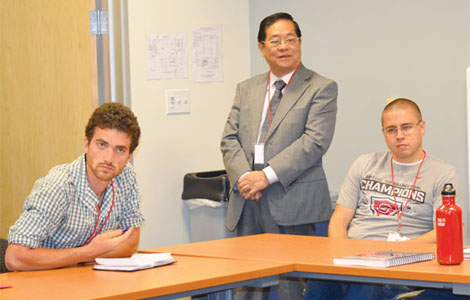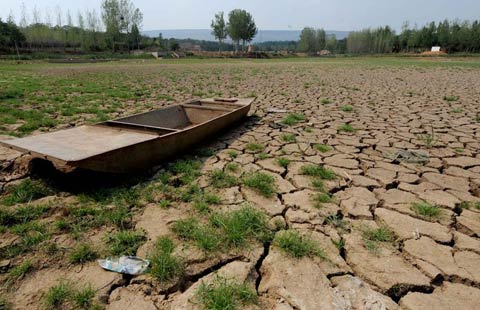Leading leaden lives
Updated: 2014-08-06 07:45
By Hou Liqiang and Feng Zhiwei (China Daily)
|
||||||||
 |
|
Cheng Chun'e, a resident who lives near a chemical factory in Dapu township, Hengdong county of Hunan province, displays tainted leaves near her house on July 5. Despite rain on the previous night, industrial pollutants are still palpable on the leaves. Photos by Hou Liqiang / China Daily |
Cause 'not confirmed'
Wen Xing, deputy head of Hengdong's publicity department, said the cause of the lead levels remains unconfirmed.

"The South China Environmental Protection Supervision Center said it may be caused by the dust from the raw materials of the factory. The raw materials were not covered properly," Wen said.
"The factory is only suspected of causing the problem. No conclusions have been made," Wen said.
When CCTV tested the dust accumulated on the windowsill of the Cheng Chun'e, another resident who lives near the factory in Dapu, results showed lead levels of 7,780 milligrams per kg.
That is more than 20 times the safe level stipulated for residential land, which is 350 milligram per kg.
Following the CCTV report, Wu Shuilin, head of the area's environment protection inspection team, and another two officials have been suspended from their duties.
Wu said his team has conducted at least 38 inspections at the factory since 2012.
"We found some small problems in the factory and gave them deadlines to rectify those," he said.
The factory's production has been "related" to lead amounts since it started operations in the 1970s, Wu said.
Affected areas
Research conducted by a team under Lyu Zhongmei, president of Hubei University of Economics, found that 44 lead pollution incidents and 19 cadmium pollution incidents occurred in China from January 2004 to December 2013.
While the team found that 80 percent of those pollution incidents occurred in underdeveloped areas like Dapu, they also found that environmental protection authorities failed to detect them.
Ma Jun, head of the Institute of Public and Environmental Affairs, an NGO that researches pollution in China, said it is more possible for such incidents to occur in the areas because of the relationship between enterprises and local government.
"In those underdeveloped areas, enterprises are an important source of local government revenue. This puts the local environmental protection bureaus in an awkward position," Ma said.
"The county leadership may interfere with the environmental protection bureau's work. As officials of the bureau are appointed by the county leadership, they may be removed from their posts if they don't listen to the county leadership," Ma said.
Ma said factories will not receive much punishment even if residents report their environmental wrongdoing, adding that people in those areas rarely take part in the environmental evaluation and monitoring processes of polluting enterprises.
"The problem can only be rooted out if local people fully participate in these processes," he said.
Contact the writers at houliqiang@chinadaily.com.cn

 US-Africa summit starts with development fora
US-Africa summit starts with development fora
 Two double-decker buses collide in New York
Two double-decker buses collide in New York
 Life in quake-hit areas of Southwest China
Life in quake-hit areas of Southwest China
 Getting teachers to teach about China
Getting teachers to teach about China
 Drought persists in Central China's Henan province
Drought persists in Central China's Henan province
 US artist creates lifelike baby animals
US artist creates lifelike baby animals
 US-Africa summit starts with fora
US-Africa summit starts with fora
 Group aims to lure back skilled Chinese talent
Group aims to lure back skilled Chinese talent
Most Viewed
Editor's Picks

|

|

|

|

|

|
Today's Top News
Barrier lakes pose threat in quake-hit Ludian
2 Canadians probed in theft of State secrets
Envoy dismisses building freeze in S. China Sea
Microsoft gets warning: Don't block watchdog
New York tests possible Ebola victim
Premier Li visits Yunnan quake site
373 dead as strong quake jolts SW China
US ready to help China in quake relief
US Weekly

|

|







